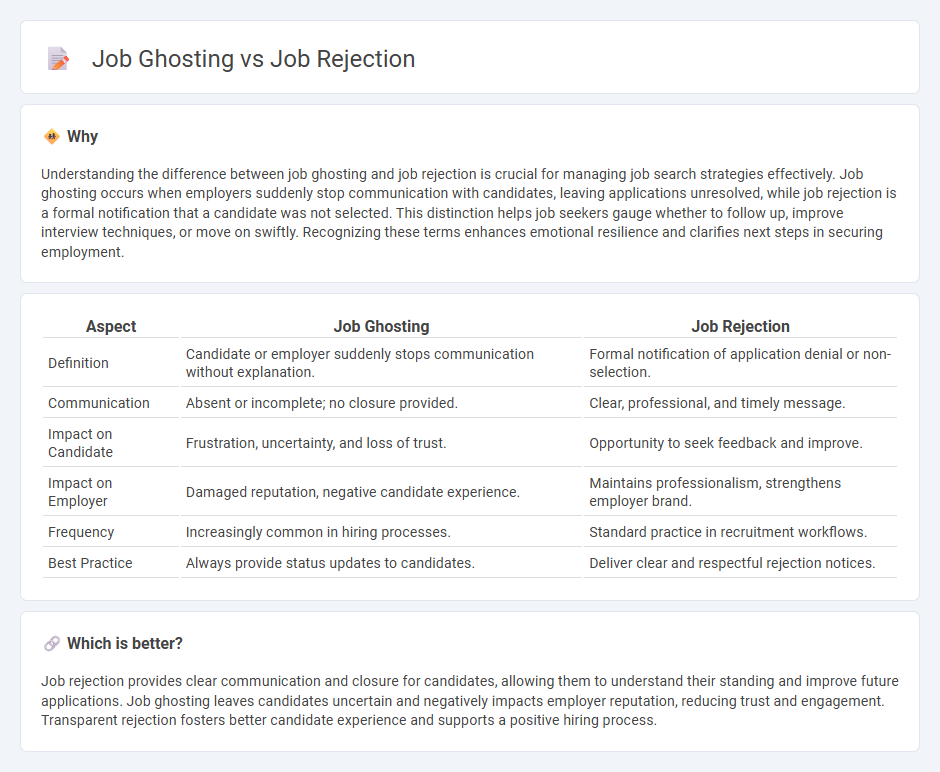
Job ghosting occurs when employers or candidates abruptly cease communication without explanation during the hiring process, creating uncertainty and frustration. Job rejection involves a clear, formal notification that a candidate was not selected for a position, providing closure and an opportunity for feedback. Explore the key differences and impacts of job ghosting versus job rejection to navigate your job search effectively.
Why it is important
Understanding the difference between job ghosting and job rejection is crucial for managing job search strategies effectively. Job ghosting occurs when employers suddenly stop communication with candidates, leaving applications unresolved, while job rejection is a formal notification that a candidate was not selected. This distinction helps job seekers gauge whether to follow up, improve interview techniques, or move on swiftly. Recognizing these terms enhances emotional resilience and clarifies next steps in securing employment.
Comparison Table
| Aspect | Job Ghosting | Job Rejection |
|---|---|---|
| Definition | Candidate or employer suddenly stops communication without explanation. | Formal notification of application denial or non-selection. |
| Communication | Absent or incomplete; no closure provided. | Clear, professional, and timely message. |
| Impact on Candidate | Frustration, uncertainty, and loss of trust. | Opportunity to seek feedback and improve. |
| Impact on Employer | Damaged reputation, negative candidate experience. | Maintains professionalism, strengthens employer brand. |
| Frequency | Increasingly common in hiring processes. | Standard practice in recruitment workflows. |
| Best Practice | Always provide status updates to candidates. | Deliver clear and respectful rejection notices. |
Which is better?
Job rejection provides clear communication and closure for candidates, allowing them to understand their standing and improve future applications. Job ghosting leaves candidates uncertain and negatively impacts employer reputation, reducing trust and engagement. Transparent rejection fosters better candidate experience and supports a positive hiring process.
Connection
Job ghosting and job rejection both impact the employment process by creating uncertainty and frustration for candidates. While job rejection provides clear feedback about the hiring decision, job ghosting leaves applicants without closure, hindering their ability to move forward. Employers who fail to communicate effectively contribute to negative candidate experiences and can damage their reputation in the talent market.
Key Terms
Feedback
Job rejection typically involves a clear communication of the employer's decision, often including constructive feedback that helps candidates understand areas for improvement. Job ghosting occurs when employers or candidates abruptly cease communication without explanation, leaving the other party without closure or actionable insights. To explore how effective feedback can enhance your job search experience, learn more about best practices in candidate communication.
Communication
Job rejection involves clear, respectful communication informing candidates of the hiring decision, often with constructive feedback to support their career growth. Job ghosting occurs when employers suddenly cease all contact, leaving candidates without closure and causing uncertainty in their job search. Explore effective communication strategies to improve candidate experience and maintain professional reputation.
Closure
Job rejection provides explicit closure by formally notifying candidates of their application status, allowing them to move forward with clarity. In contrast, job ghosting leaves applicants without communication, causing uncertainty and emotional distress due to the lack of resolution. Explore effective strategies for obtaining closure in the job search process to enhance your career journey.
Source and External Links
Rejected For a Job I Was Perfect For - Job rejection can feel deeply painful, especially when you believed you were the perfect fit, and it's important to acknowledge and grieve the loss while avoiding feelings of entitlement or resignation to move forward effectively.
12 Tips for Managing Job Rejections - Managing emotions, staying objective, and focusing on the positive aspects of your career are key strategies to handle the common and professional nature of job rejections for a successful job search.
Job Rejection: Finding Strength and Moving Forward - Job rejections can severely impact mental health and self-esteem, but developing resilience and practicing self-care are essential for overcoming the emotional toll of repeated job search setbacks.
 dowidth.com
dowidth.com